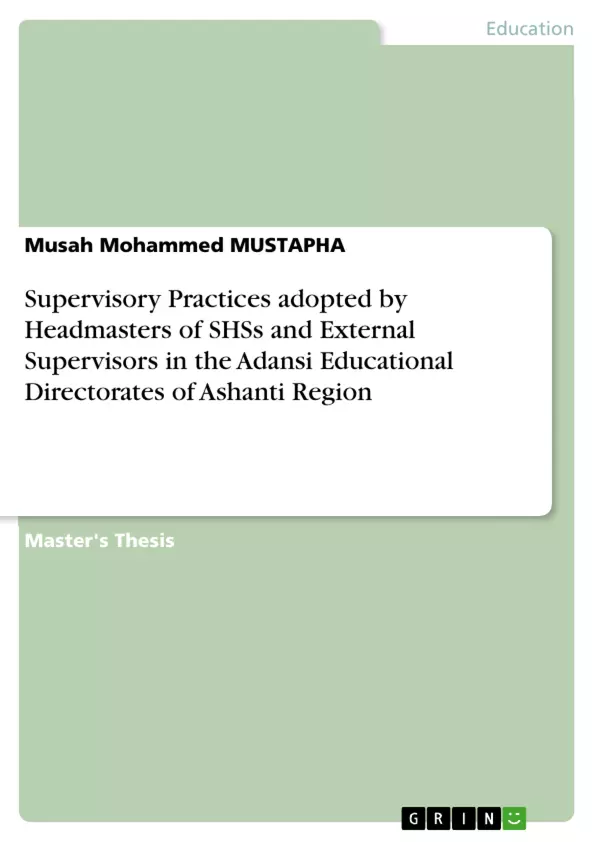The success of any organization or institution has never been achieved inadvertently. It is realized by putting in place necessary mechanisms among which supervision plays a fundamental role in all the processes. This study was specifically conducted to assess the supervisory practices opted for by supervisors of SHSs in Adansi Education Directorates in the Ashanti Region of Ghana. The study employed mixed method concurrent triangulation design involving both qualitative and quantitative data collection and analysis. Thus questionnaire and interview were the instruments used while Headmasters, teachers, students and External/Circuit supervisors formed the population.
The study attested to the fact that effective instructional supervision ,both the external and particularly, the internal types are sine qua-non to the achievement of effective and efficient teaching and learning in secondary schools; which in turn translate into higher students’ academic achievement.
The findings revealed that during supervision, headmasters in particular and external supervisors assessed teachers’ scheme of work, lesson plans, instructional times, punctuality, attendance and methods of teachings in the classrooms. They ensured that teachers had the necessary materials for teaching and organized in-service training for teachers to promote effective teaching in their respective schools. It was found that supervisory practices adopted by headmasters and external supervisors depended on performance of students in their terminal and external final exams. The study also discovered that supervisory practices opted for by headmasters in particular, and external supervisors improved teaching and learning process, students’ performance in internal terminal and external final exams. It was also revealed that there were inherent challenges posed by teachers, students and government that confront supervision which needs to be urgently addressed through collaborative effort of all stakeholders for the achievement of quality education. The study has recommended that contemporary supervisory models emphasising motivation and autonomy of teachers should be embraced for optimum teacher-output to optimize students’ achievement.
Table of Contents
- CHAPTER ONE: INTRODUCTION
- CHAPTER TWO: REVIEW OF RELATED LITERATURE
- Conceptual Framework
- Theoretical Framework
- Empirical Literature
- CHAPTER THREE: RESEARCH METHODOLOGY
- Research Design
- Population of the Study
- Sampling Technique
- Instrumentation
- Data Collection Procedures
- Data Analysis Techniques
- CHAPTER FOUR: DATA PRESENTATION, ANALYSIS AND DISCUSSION
- CHAPTER FIVE: SUMMARY OF FINDINGS, CONCLUSIONS AND RECOMMENDATIONS
Objectives and Key Themes
This thesis investigates the effectiveness of supervisory practices employed by headmasters and external supervisors in secondary schools within the Adansi Educational Directorates of the Ashanti Region, Ghana. The study aims to understand the impact of these practices on teaching, learning, and student academic achievement.
- Evaluation of supervisory practices implemented by headmasters and external supervisors
- Assessment of the impact of supervision on teaching and learning processes
- Analysis of the relationship between supervisory practices and student academic performance
- Identification of challenges faced in effective supervision
- Recommendations for enhancing supervisory practices and improving educational outcomes
Chapter Summaries
- Chapter One: Introduction
This chapter introduces the research topic, outlines its significance, and establishes the research problem. It provides background information about the context of the study and highlights the gaps in existing knowledge that the research aims to address.
- Chapter Two: Review of Related Literature
This chapter presents a comprehensive review of existing literature related to the research topic. It examines various theoretical frameworks, empirical studies, and conceptual perspectives relevant to supervisory practices in educational settings.
- Chapter Three: Research Methodology
This chapter outlines the research design, methodology, and procedures employed in the study. It describes the population, sampling techniques, instruments used for data collection, and data analysis methods. The chapter also addresses the ethical considerations and limitations of the study.
- Chapter Four: Data Presentation, Analysis, and Discussion
This chapter presents and analyzes the data collected through the study. It presents findings, interprets results, and discusses the significance of the findings in relation to existing literature and theoretical frameworks.
Keywords
The primary focus of this research centers on the assessment of supervisory practices in secondary schools within the Adansi Educational Directorates of the Ashanti Region, Ghana. Key concepts include instructional supervision, headmaster supervision, external supervision, teaching and learning, student academic achievement, and challenges to effective supervision. The study examines various supervisory models and their impact on teacher effectiveness, student performance, and overall educational quality.
- Citation du texte
- Musah Mohammed MUSTAPHA (Auteur), 2018, Supervisory Practices adopted by Headmasters of SHSs and External Supervisors in the Adansi Educational Directorates of Ashanti Region, Munich, GRIN Verlag, https://www.grin.com/document/502556



